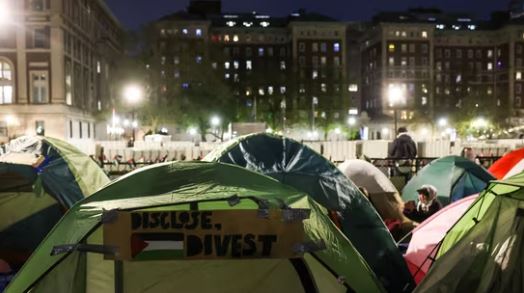Columbia University students involved in a pro-Palestinian encampment have been given a deadline until Tuesday midnight to resolve negotiations with the university, as reported by CNN. Columbia President Minouche Shafik stated that if no agreement was reached by midnight, the university would explore ‘alternative options’.
While talks were ongoing, concerns arose among donors and lawmakers who advocated for police intervention to clear the encampment. This suggestion drew criticism, especially considering the university’s recent decision to involve the New York Police Department in dispersing another student encampment.
What’s happening at Columbia University campus?
Over a 100 pro-Palestinian demonstrators have camped out at Columbia have been arrested, with dozens more people arrested at other campuses
Despite the pressure, as of 12:10 a.m. ET (Tuesday), Columbia University had not requested assistance from the NYPD to address the encampment. Meanwhile, the number of tents on campus had swelled to over 80, with hundreds of people gathered in and around the encampment.
Amidst growing chants of against Israel’s action in Gaza many jew students have reported antisemitic chants and messages at and around the Columbia campus. Some Jewish students say they’ve felt unsafe on campus. The White House, in a message Sunday to mark the Passover holiday, denounced what it called an “alarming surge” of antisemitism, saying it “has absolutely no place on college campuses, or anywhere in our country.”
What are Columbia University students demanding?
The protesters are demanding that their universities condemn Israel’s assault on Gaza after the Oct. 7 Hamas attack and divest from companies that do business with Israel.
The prolonged protests and gatherings outside the university gates have heightened safety worries, particularly among Jewish students celebrating the Passover holiday. While acknowledging the importance of free speech and peaceful protests, President Shafik expressed concerns about the encampment’s impact on campus safety and community harmony.
White House and House Speaker have expressed concern
As tensions escalate, elected officials, including House Speaker Mike Johnson and Mayor Eric Adams, have weighed in on the situation. Johnson plans to visit Jewish students at Columbia University to address rising anti-semitism concerns, while Mayor Adams identified “outside agitators” contributing to disruptions at peaceful protests.
The Columbia University encampment is part of a broader trend seen across campuses nationwide, with similar protests and encampments emerging in solidarity with Gaza. Students at various universities, including Yale, Harvard, and MIT, have staged protests and encampments, calling for divestment from Israel-related investments and transparency in university finances.
The protests at Columbia University continue as students demand complete divestment from Israel-related investments, financial transparency, and amnesty from disciplinary actions. While university officials have warned about violating school rules, some students feel compelled to express their activism despite safety concerns.
The prolonged protests have garnered national attention, with lawmakers and the White House weighing in on the situation. While supporting the right to peaceful protest, officials have denounced violence and antisemitic rhetoric, emphasizing the need to address issues of hatred and discrimination collectively as Americans.





